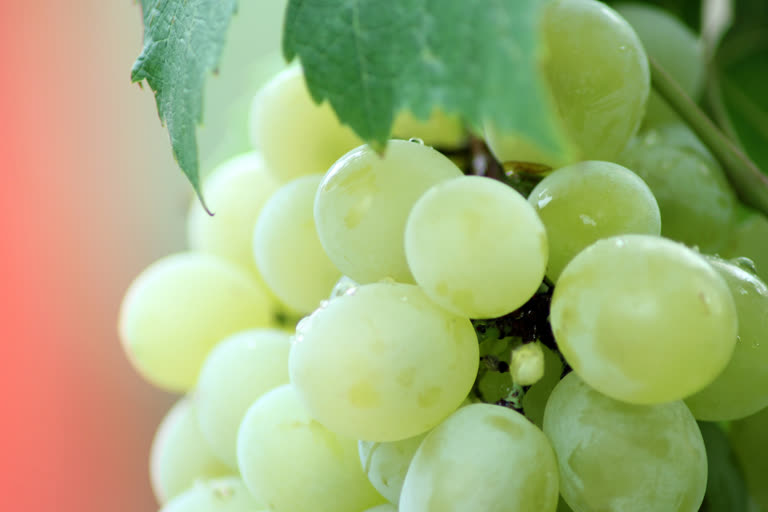Santorini: Rising global temperatures create new challenges for the wineries in Santorini, but the resilience of the vines and methods give them a headstart. Higher temperatures affect the quality of white grapes and as a result the character of their wines.
The picturesque Greek island of Santorini is known for producing award-winning wines in an unforgiving environment but rising temperatures have created fresh hurdles for the regional wineries.
In Santorini, the vines are pruned into a low circular basket allowing the leaves to grow around the white grapes to protect them from the wind and the sun.
This year's grape production is down by a third in comparison to 2018 levels.
Pickers are finding fewer and fewer grapes to harvest.
This isn't a one-off, according to chief enologist at Hadjidakis winery Stella Papadimitriou.
She said that the harvest has been smaller every year for the past decade.
"In 2019, the current harvest is 30 to 40 percent less than what it was in 2018. But if we compared it to 2017, then we are talking about over a 50 percent reduction," Papadimitriou said.
She believes rising temperatures and changes in rain patterns are among the biggest factors for the decrease.
The wine industry worldwide has been rocked by the effects of climate change, with grape quality and vineyard production immediately impacted by the slightest change of temperature.
What worries the Santorini winemakers is not the yield, but how rising global temperatures will affect the quality of their indigenous white grapes and as a result the character of their wines.
Santorini wines are known for their sharpness and high acidity.
Higher temperatures could change the acidity of the grape and lead to a more fruity, sweeter wine.
"The actual vines will certainly continue to exist even in the most difficult areas, but the quantity of grapes will decrease and the quality will change. All we can do, since we cannot go against climate change, is to gradually change some of the techniques that we employ," said Papadimitriou.
She believes that those changes will have to be implemented in the vines, irrigation projects and protection against sunburn for grapes.
Santorini is believed to have some of the oldest vineyards in continuous cultivation in the world.
Local wineries say some of the vine roots are centuries old.
The vines on the island are free from diseases and pests, due to the volcanic soil and strong winds. Most farmers cultivate their vineyards organically.
Gavalas Winery has been in the hands of the same family for five generations. The winery and its producers have slowly but steadily altered their harvest calendar in recent years.
Co-owner of the winery, Vagelis Gavalas said, "From year to year there are small differences, some years are hotter, some are less so. Last year we started (the harvest) around July 28-29, the year before last, it was August 5 and this year, we started around August 8 to 10. But we have noticed that in general, compared to 30 or 40 years ago, we start about two weeks earlier because the temperatures have gone up and the climate is hotter."
A new scientific study published in the European Geosciences Union (EGU) journal Climate of the Past, shows a similar trend in the French wine-growing region of Burgundy.
The results show that over the past thirty years grape harvest in the region had begun 13 days earlier on average since 1988.
Carved in the cliffs overlooking Santorini's most iconic view, the Venetsanos Winery was the first winery to export Assyrtiko wines to foreign markets.
Assyrtiko is a rare, classy white grape, possibly some of the greatest varieties found in the Mediterranean basin.
Manager Petros Vamvakousis said that he is worried about rising temperatures and increased competition for valuable land plots and water with the powerful tourist sector on the island.
"The way we deal with the environment and the vineyard, in particular, is certainly very important here. I think we are at a turning point. The winemakers and the vineyard owners will need to come together in the next few years and identify the most important factors that are required to keep going," he said.
The island of Santorini measures 9000 hectares. 1,200 hectares of land are dedicated to vineyards.
The small number of farmers are in constant struggle with new hotels and construction projects being built on this island, which receives more than 2 million visitors every year.
To add to the battle for space, producers fear that there will be soon a fight for water.
Irrigation is currently only used by a tiny fraction of vineyard owners but as heatwaves become more frequent and rain patterns unpredictable, many are looking at this option.
"We definitely need water to help the crops, especially the vine. And water is not easy to find right now on the island," said Vamvakousis.
"The municipality of Santorini has a programme to reuse water, to treat wastewater coming from hotels, from homes, etc. and instead of returning it to the sea, use it for agriculture. Obviously, the water would go through special filters so it can be used for cultivation," he added.
The wastewater system set up by the authorities is currently being used in the cultivation of crops like tomatoes, but wine producers are looking into how to best appropriate the system for their own purposes.
Read also: Lam rejects suggestion China refuses to let her quit



